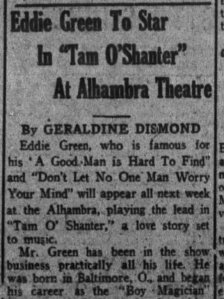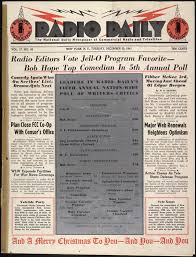
One thing I like about posting on WordPress is that I can write any way I choose. I can start a sentence with the word “and” or I can use “I’ve” instead of “I have”. I can even place my commas or periods in the wrong place. We are informal. So, let me begin. The other day a Twitter friend posted an Amos n Andy 1951 television broadcast on Youtube, titled “The Young Girl’s Mother”. It seemed familiar and I remembered that in 1951 the same story had been performed on the Amos n Andy radio program and my mother, Norma Green and Dorothy Dandridge were two of the characters in the episode: “The Amos ‘n’ Andy Show. February 25, 1951. CBS net. “Andy Meets Girl’s Mother”. Rexall. Andy has proposed to twenty-two year-old Brenda Thompson, not realizing she’s the daughter of Madame Queen! Madame Queen is willing to settle for Andy as a son-in-law, if not a husband. The opening is slightly upcut. Bill Hay does one of the commercials. Bob Ross (writer), Griff Barnett (commercial spokesman), Bill Hay, Jeff Alexander and His Orchestra (music), Ken Niles (announcer), Bob Mosher (writer), Joe Connelly (writer), Freeman Gosden, Charles Correll, Johnny Lee, Lillian Randolph, Dorothy Dandridge, Norma Green.” Radiogoldin.library
I was too surprised when I found this out in 2015 since my mother hadn’t bothered to tell me about it. Anywho, I watched the television episode. The episode was funny, however, I could see why the NAACP tried successfully to get it off prime time television (I think it ran a while in re-runs). The Andy and Kingfish characters, Spencer Williams and Tim Moore, had been instructed and coached on how to be the voices of Andy and Kingfish. So they both spoke like this: “I done popped the question and she done accepted”. And this: “You gone with a lot of girls since I knowed you”. And this: “what is I gonna do?”
As I watched this show today, I cringed at the way they talked. I wondered if we as Black people really talked that way back then. Or did Correll and Gosden, the show’s creators, just want them to talk that way because that was how Correll and Gosden talked when they pretended to be Black men when the show was on the radio. I do believe Williams and Moore went along with the script because that was one of the only ways a Black man could make a decent amount of money. Racism was rampant in 1951 in the entertainment business.

But racism was present also in Black families. Take my family, for instance. My maternal grandmother looked White. She listed herself as Spanish on my mother’s elementary school papers. She was not Spanish. Her mother and father were lightskinned Black people. My maternal grandfather was Italian, so my mother looked White. When my father, Eddie, started courting my mother, (here they are on the left) my grandmother would make Eddie come around to the back door as opposed to letting him in the front. Yes, because Eddie was dark-skinned. Fast forward to 1980, the rumor was that I was asked by an older family member to live in and take care of “nana’s” house because I am light-skinned as opposed to asking one of our darker skinned family members. The same person who requested this of me would not even entertain the thought of having a dark-skinned grandchild. Even though her own mother was dark-skinned.
Racism exists everywhere. Still. Today. It is not surprising to me from whence it comes. It exists. As a lightskinned person I have been accused of ignoring a man who spoke to me at a bus stop because I thought I was “too good” because I was light. I have friends today who speak about me as being “high-yellow”. Why do they mention the color of my skin when they see me? Who knows. Everyone has an opinion on something. We cannot censure the thoughts that run through people’s heads and if these thoughts pop out of their mouths, we can’t stop that either.
There has been some so-called “shocking” news in the world today, which makes me believe that people are refusing to live in the world of reality. They seem to want to believe in a fictional world. Which is why I have written this post. I try and find a way to express my opinions without being nasty, and because if I say nothing these thoughts just keep me awake at night.
The thing is, in my opinion, is that not everybody is going to be ok with everybody. Not just in the area of skin color, but in what school you attend, or whether you say tomato or tomawto. Or whether you mention your religious beliefs online. Some people will not have it. There was a time when I let that stop me from sharing my thoughts on how I worship, now I know that other people’s opinions are their opinions and that the reality is their opinions have nothing to do with how my life is lived.

In writing my books about The Jeffersons and about the TV sitcom Maude, I have had to figure out how to connect the fiction of a television program’s scripts with real life in order to be able to write an interesting, relevant and entertaining book. And believe you me, some of these shows dealt with some serious and controversial reality issues, even while providing laughs. For instance, in the Maude episode “The Kiss”, Maude catches her next door neighbor, Vivian kissing her (Maud’s) husband, Walter. Walter gives her an explanation about how Vivian and Maude are such good friends and how that spills over to Walter and somehow they were just consoling each other as friends. And Maude seems to go along with the explanation. Of course, I’m sitting there watching this and screaming at my laptop BS!! I don’t know too many women who would go for THAT explanation in real life!
I appreciate your stopping by and spending some time with me and my thoughts. Until next time, thanx. 🙂 Tell your friends about me. Share the love. Comments and shared experiences are always welcome. Stay safe.

 Going slightly off topic here today. Trending is a the subject of a Dove advertisement. Black people are not happy with this ad, on Twitter. There is a video that goes with the ad but at first all I saw was this picture. For the life of me I could not figure out why people were upset. I saw one Black woman in two shots and one White woman in two shots. Black woman before Dove and after Dove. White woman before Dove and after Dove. I thought it was a stupid ad. I stared at it for five minutes trying to figure out why folks were angry. Then I decided to look further and I found the video. And cracked up. The video shows the Black lady in the act of taking off her shirt and changing into a White woman. I laughed out loud because how Dove came up with this idea in this day and age shows how truly out of touch these people are. It’s laughable. Of course they may not see themselves as out of touch. Dove is an old company with perhaps old ideas, still. If they ever wanted to lose business this ought to do it.
Going slightly off topic here today. Trending is a the subject of a Dove advertisement. Black people are not happy with this ad, on Twitter. There is a video that goes with the ad but at first all I saw was this picture. For the life of me I could not figure out why people were upset. I saw one Black woman in two shots and one White woman in two shots. Black woman before Dove and after Dove. White woman before Dove and after Dove. I thought it was a stupid ad. I stared at it for five minutes trying to figure out why folks were angry. Then I decided to look further and I found the video. And cracked up. The video shows the Black lady in the act of taking off her shirt and changing into a White woman. I laughed out loud because how Dove came up with this idea in this day and age shows how truly out of touch these people are. It’s laughable. Of course they may not see themselves as out of touch. Dove is an old company with perhaps old ideas, still. If they ever wanted to lose business this ought to do it. What I realized about myself, though, is that the ad did not make me angry. At first I didn’t even get it. I was clueless. When I did get it I still was not angry, just shocked that their ad department thought it up. I realize that I do not react angrily at seemingly racist episodes. As a Black woman I am not constantly seeing racism. Or Black and White. I see people. And being a light-skinned Black person has meant that I experience rude remarks from other Black people. Some call me High-Yellow as in “Oh you high-yellow, you’re too good to speak too me!”. So I got used to it and got over it. I’m just me. Living life. Sometimes struggling and sometimes not, just like a million other people. Besides, one look at the members of my family shows you we represent every skin color, so we fit in everywhere. This picture is my brother (Brad), my niece (from my late brother’s (Lance) first wife, me, my brother (Brian) and my daughter (Melony). Both of my brothers have had to fight over the fact that they look White. But we all look beautiful. Colorful.
What I realized about myself, though, is that the ad did not make me angry. At first I didn’t even get it. I was clueless. When I did get it I still was not angry, just shocked that their ad department thought it up. I realize that I do not react angrily at seemingly racist episodes. As a Black woman I am not constantly seeing racism. Or Black and White. I see people. And being a light-skinned Black person has meant that I experience rude remarks from other Black people. Some call me High-Yellow as in “Oh you high-yellow, you’re too good to speak too me!”. So I got used to it and got over it. I’m just me. Living life. Sometimes struggling and sometimes not, just like a million other people. Besides, one look at the members of my family shows you we represent every skin color, so we fit in everywhere. This picture is my brother (Brad), my niece (from my late brother’s (Lance) first wife, me, my brother (Brian) and my daughter (Melony). Both of my brothers have had to fight over the fact that they look White. But we all look beautiful. Colorful. Here is my sister and her two daughters (Donna in the middle, Alex and Brittney). Everyone in the family used to tease Donna because she looked so different from us. Hispanic. Her dad even had a name for her that I cannot use in today’s world without backlash. All three of these ladies are beautiful, too.
Here is my sister and her two daughters (Donna in the middle, Alex and Brittney). Everyone in the family used to tease Donna because she looked so different from us. Hispanic. Her dad even had a name for her that I cannot use in today’s world without backlash. All three of these ladies are beautiful, too. Here is my late brother’s daughter and grandsons from his second wife. So cute!! She sang on video at my Book Soup book signing. We all have issues, so I did not get to meet this part of my family until last year.
Here is my late brother’s daughter and grandsons from his second wife. So cute!! She sang on video at my Book Soup book signing. We all have issues, so I did not get to meet this part of my family until last year. Ah, my cousin, Little Jim. Gone now. Did I have a major crush on him. He has beautiful grand-kids that unfortunately never met him. He was the family hero. Sharp dresser. Fine.
Ah, my cousin, Little Jim. Gone now. Did I have a major crush on him. He has beautiful grand-kids that unfortunately never met him. He was the family hero. Sharp dresser. Fine. This is my new favorite. Kellan. My cousin Roddy’s grandson. Ain’t he cute!
This is my new favorite. Kellan. My cousin Roddy’s grandson. Ain’t he cute!











 Let 2017 be your year of overcoming the obstacles. In our world today there seems to be a lot of obstacles: racism, poverty, joblessness. But I have come to learn in my own life and through writing my father’s biography, that obstacles don’t signify stopping points. Unless you live in Chester’s Mill “Under the Dome.” (A fictional TV program that I loved-the town people couldn’t go under the Dome or around it or through it.) In real life obstacles can be overcome.
Let 2017 be your year of overcoming the obstacles. In our world today there seems to be a lot of obstacles: racism, poverty, joblessness. But I have come to learn in my own life and through writing my father’s biography, that obstacles don’t signify stopping points. Unless you live in Chester’s Mill “Under the Dome.” (A fictional TV program that I loved-the town people couldn’t go under the Dome or around it or through it.) In real life obstacles can be overcome.